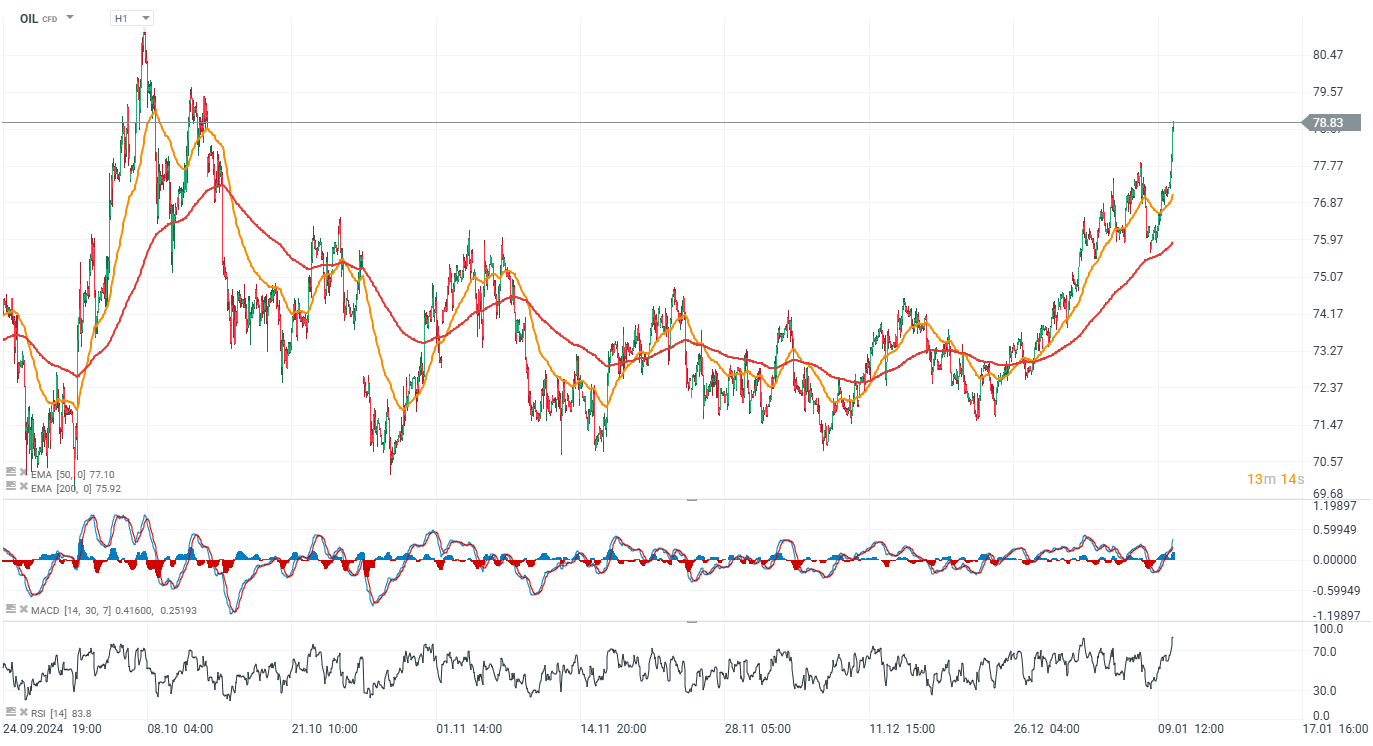Brent Crude oil (OIL) is gaining nearly 2% today, with the market pricing in improved fundamentals supported by geopolitics, colder temperatures and real concerns about supply disruptions and the impact of sanctions. The risk factors have nearly overshadowed broader economic uncertainty about China and Europe growth, and oil prices are trailing the dollar and US treasury bonds yields being on track for a third straight weekly gain after falling to near three-year lows in early December 2024.
- J.P. Morgan expects global oil demand to increase significantly by 1.6 million barrels per day year-on-year in the first quarter of 2025, mainly driven by higher demand for heating oil, kerosene and LPG
- Analysts estimated that for every degree Fahrenheit by which the temperature drops below the 10-year average for winter, it causes oil demand to increase by 113,000 barrels per day
- Additionally, this demand is being driven by colder weather than in the past two winters, both in Europe and the United States.
- The market is concerned that the latest sanctions imposed on Russia by the Biden administration could negatively affect supply.
- Russia's oil production in December fell below the OPEC+ target, to 8.971 million barrels per day of oil in the final month of 2024, 7,000 barrels per day less than agreed.
- The outgoing U.S. administration has conveyed that it will impose tariffs on tankers carrying Russian petroleum products above the $60 per barrel limit imposed by the U.S. and its European allies.
The risk of China and Iran?
- China's Shandong port group has issued a notice banning the unloading of oil from US-sanctioned oil vessels. The port is a key oil import hub on China's east coast and manages three major terminals.
- If such a ban is made permanent, it could increase transportation costs for independent refiners in Shandong, which are major recipients of sanctioned oil, and slow down crude imports into China. China's Foreign Ministry said it was unaware of the Shandong Port Group's decision to ban US-sanctioned ships from its ports.
- It is likely that Donald Trump will strengthen restrictions on Iranian oil exports once in power, potentially causing disruptions that could amount to up to 1 million barrels per day i.e. about 1% of global supply.
At its last meeting, OPEC+ postponed its plan to withdraw from joint production cuts in the wake of slowing global demand and rising US production last month. The organization, which supplies about half of the world's oil, decided to delay the production increase by three months and the full recovery of output by a full year, until the end of 2026. 
Source: xStation5

BREAKING: Massive increase in US oil reserves!

Market wrap: Oil gains amid US - Iran tensions 📈 European indices muted before US NFP report

📈 Gold jumps 1.5% ahead of NFP, hitting its highest level since Jan. 30

Silver rallies 3% 📈 A return of bullish momentum in precious metals?
This content has been created by XTB S.A. This service is provided by XTB S.A., with its registered office in Warsaw, at Prosta 67, 00-838 Warsaw, Poland, entered in the register of entrepreneurs of the National Court Register (Krajowy Rejestr Sądowy) conducted by District Court for the Capital City of Warsaw, XII Commercial Division of the National Court Register under KRS number 0000217580, REGON number 015803782 and Tax Identification Number (NIP) 527-24-43-955, with the fully paid up share capital in the amount of PLN 5.869.181,75. XTB S.A. conducts brokerage activities on the basis of the license granted by Polish Securities and Exchange Commission on 8th November 2005 No. DDM-M-4021-57-1/2005 and is supervised by Polish Supervision Authority.


